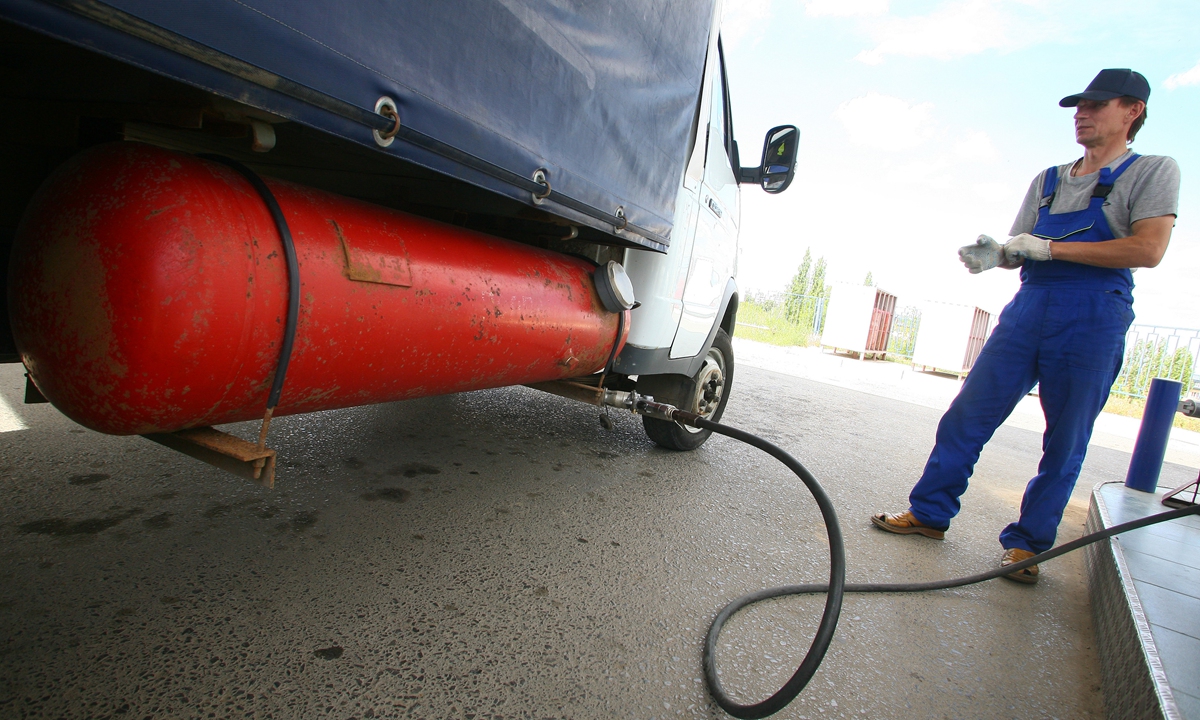
A van is being filled with fuel at a liquefied natural gas (LNG) station in Volgograd, Russia.Photo: VCG
The European Union (EU) on Friday struck a major deal on liquefied natural gas (LNG) with the US, a move that will come with a hefty bill for European taxpayers, while huge profits for US LNG producers who have long been seeking buyers amid intense competition from Russia.
Observers said since the US LNG cannot cover the gap Russia gas has left in the short term, it's possible that some European countries may need to turn to other options such as coal to meet winter demand.
According to a White House statement, the US and the European Commission will immediately establish a joint Task Force on Energy Security to set out the parameters of this cooperation and execute its implementation. The US will provide the EU with at least 15 billion additional cubic meters of LNG by the end of the year.
The statement did not specify how much the EU will pay the US for the LNG, while saying the European Commission will work with EU member states toward ensuring a stable demand for additional US LNG until at least 2030 of approximately 50 bcm/annum, on the understanding that the price formula of LNG supplies to the EU should reflect long-term market fundamentals.
Industry players warned that for EU countries, higher costs may come from everywhere.
US LNG is not an ideal option for the EU. It's a forced choice that the bloc has to resort to in the current situation, Lin Boqiang, director of the China Center for Energy Economics Research at Xiamen University, told the Global Times on Friday.
Observers said the logistics cost of LNG within the EU is also a problem. The existing LNG terminals are largely distributed in Spain, and the degree of interconnection between countries is not high. Urgent actions are needed to strengthen existing facilities and immediate investment.
Belgium-based Bruegel, an economics research institute, estimates that the short-term cost of reducing the EU's energy dependence on Russia may reach 100 billion euros ($110.05 billion) - 50 billion euros for replenishing natural gas reserves, 25 billion euros for additional costs of importing non-Russian gas, and 25 billion euros for internal distribution costs in the EU.
Who will pay the costs and how they would be shared also remain a problem within the EU, observers said.
But for the US, it's a great deal since it now has "defeated" its biggest competitor Russia, and found a solid buyer for its LNG products, making it again the biggest beneficiary of the crisis, Zhao Junjie, a research fellow at the Chinese Academy of Social Sciences' Institute of European Studies, told the Global Times on Friday.
"Through the pact, the US now successfully 'kidnapped' the EU to take on its boat, and paid the cost for the crisis it created," Zhao said.
US exporters have shipped record volumes of LNG to Europe for three consecutive months, as prices have jumped more than 10 times than a year ago. Europe is competing in global markets for tight LNG supply, according to a Reuters report.
The pact, announced during a visit by US President Joe Biden to Brussels, follows a day of three summits in the city where leaders lambasted Russia on the Ukraine crisis. "We're coming together to reduce Europe's dependence on Russia's energy," Biden told reporters.
The US has also been lobbying the EU to sanction Russian oil and gas directly. European countries still remain divided on the "suggestion." Poland and Latvia are among the countries seeking to halt the hundreds of millions of euros per day Europe pays Russia for fossil fuels. Germany, which receives 18 percent of Russia's gas exports, and Hungary are among those opposed, citing the economic damage an oil embargo would unleash.
Russia supplies 40 percent of the EU's collective gas needs, 27 percent of its oil imports and 46 percent of coal imports.
"It's hard for the EU to say farewell to Russia's gas supply," Zhao said.




